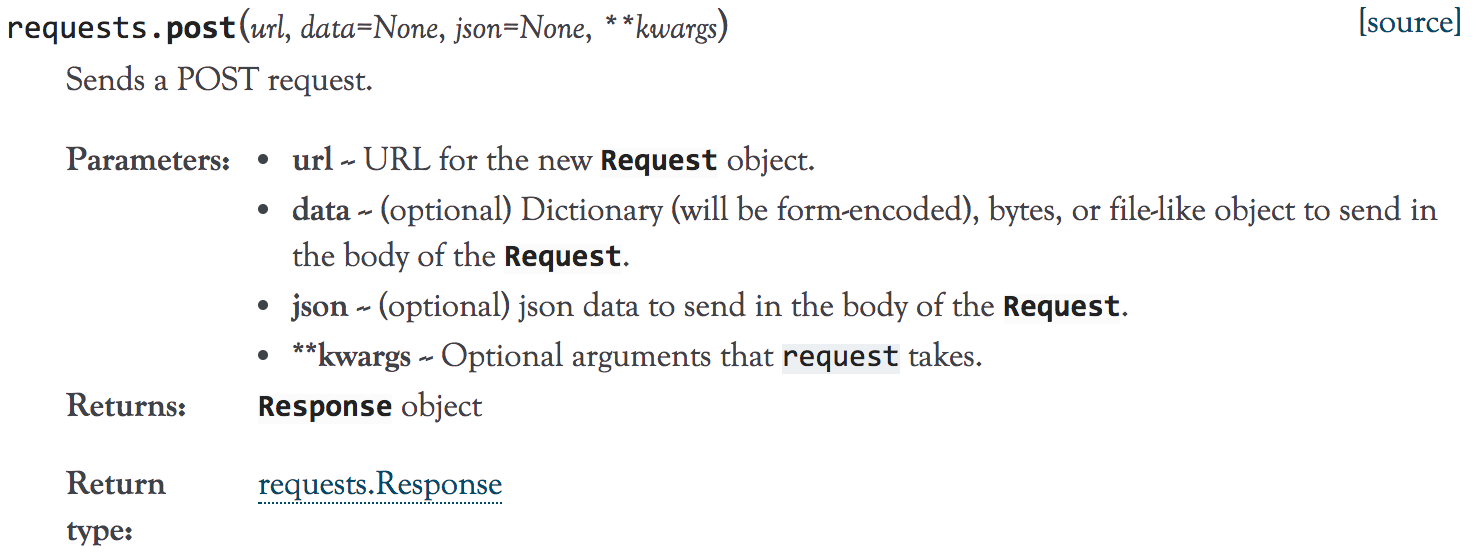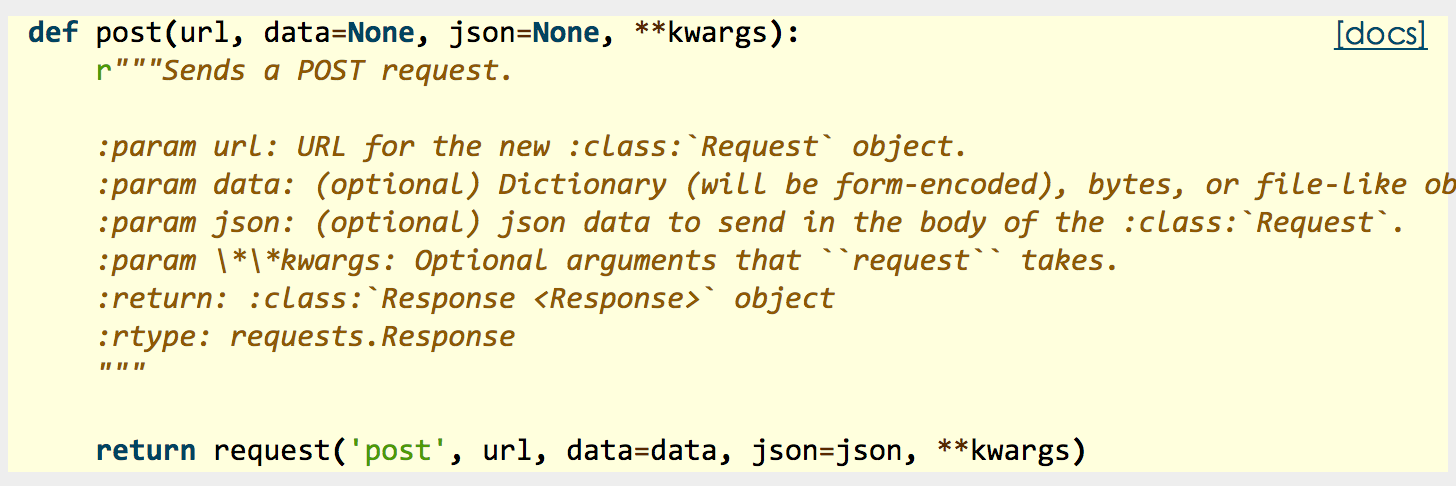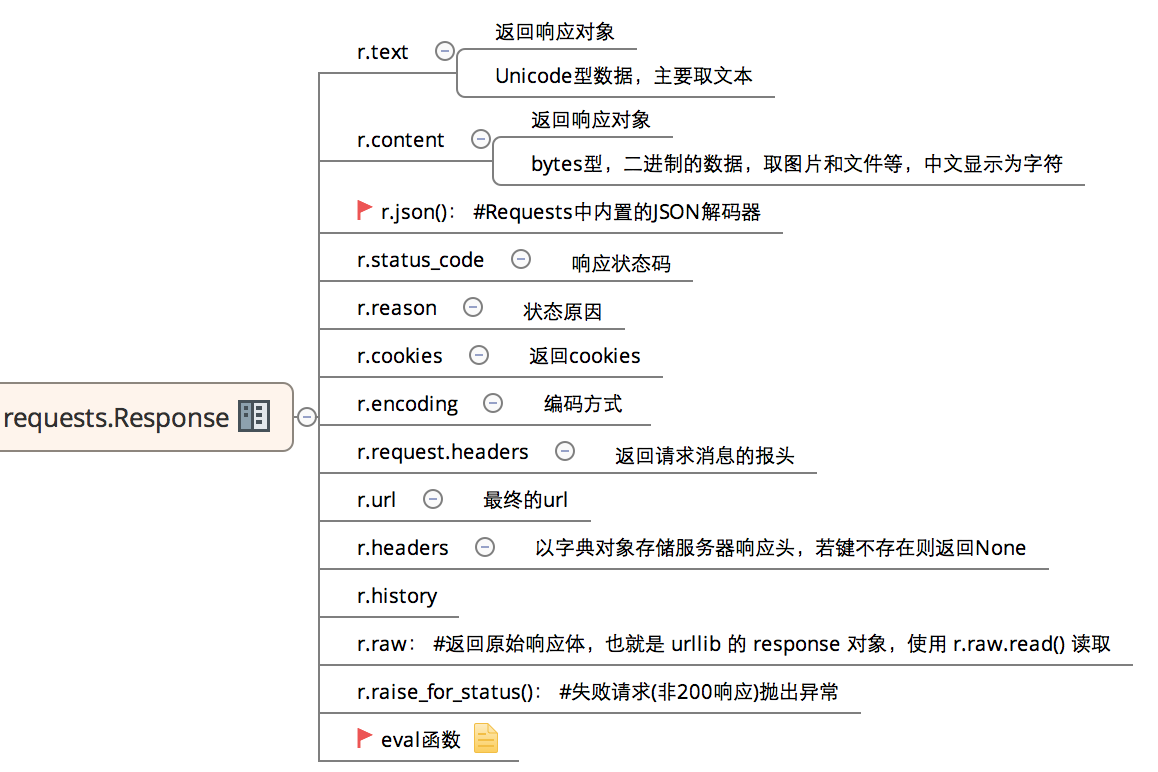接口自动化测试 (三)request.post
上一节介绍了 requests.get() 方法的基本使用,本节介绍 requests.post() 方法的使用:
本文目录:
一、方法定义
二、post方法简单使用
1、带数据的post
2、带header的post
3、带json的post
4、带参数的post
5、普通文件上传
6、定制化文件上传
7、多文件上传
一、方法定义:
1、到官方文档去了下requests.post()方法的定义,如下:

2、源码:

3、常用返回信息:

二、post方法简单使用:
1、带数据的post:

# -*- coding:utf-8 -*-
import requests
import json host = "http://httpbin.org/"
endpoint = "post"
url = ''.join([host,endpoint])
data = {'key1':'value1','key2':'value2'} r = requests.post(url,data=data)
#response = r.json()
print (r.text)

输出:

{
"args": {},
"data": "",
"files": {},
"form": {
"key1": "value1",
"key2": "value2"
},
"headers": {
"Accept": "*/*",
"Accept-Encoding": "gzip, deflate",
"Connection": "close",
"Content-Length": "23",
"Content-Type": "application/x-www-form-urlencoded",
"Host": "httpbin.org",
"User-Agent": "python-requests/2.18.1"
},
"json": null,
"origin": "183.14.133.88",
"url": "http://httpbin.org/post"
}

2、带header的post:

# -*- coding:utf-8 -*-
import requests
import json
host = "http://httpbin.org/"
endpoint = "post" url = ''.join([host,endpoint])
headers = {"User-Agent":"test request headers"} # r = requests.post(url)
r = requests.post(url,headers=headers)
#response = r.json()

输出:

{
"args": {},
"data": "",
"files": {},
"form": {},
"headers": {
"Accept": "*/*",
"Accept-Encoding": "gzip, deflate",
"Connection": "close",
"Content-Length": "0",
"Host": "httpbin.org",
"User-Agent": "test request headers"
},
"json": null,
"origin": "183.14.133.88",
"url": "http://httpbin.org/post"
}

3、带json的post:

# -*- coding:utf-8 -*-
import requests
import json host = "http://httpbin.org/"
endpoint = "post"
url = ''.join([host,endpoint])
data = {
"sites": [
{ "name":"test" , "url":"www.test.com" },
{ "name":"google" , "url":"www.google.com" },
{ "name":"weibo" , "url":"www.weibo.com" }
]
} r = requests.post(url,json=data)
# r = requests.post(url,data=json.dumps(data))
response = r.json()

输出:

{
"args": {},
"data": "{\"sites\": [{\"url\": \"www.test.com\", \"name\": \"test\"}, {\"url\": \"www.google.com\", \"name\": \"google\"}, {\"url\": \"www.weibo.com\", \"name\": \"weibo\"}]}",
"files": {},
"form": {},
"headers": {
"Accept": "*/*",
"Accept-Encoding": "gzip, deflate",
"Connection": "close",
"Content-Length": "140",
"Content-Type": "application/json",
"Host": "httpbin.org",
"User-Agent": "python-requests/2.18.1"
},
"json": {
"sites": [
{
"name": "test",
"url": "www.test.com"
},
{
"name": "google",
"url": "www.google.com"
},
{
"name": "weibo",
"url": "www.weibo.com"
}
]
},
"origin": "183.14.133.88",
"url": "http://httpbin.org/post"
}

4、带参数的post:

# -*- coding:utf-8 -*-
import requests
import json host = "http://httpbin.org/"
endpoint = "post" url = ''.join([host,endpoint])
params = {'key1':'params1','key2':'params2'} # r = requests.post(url)
r = requests.post(url,params=params)
#response = r.json()
print (r.text)

输出:

{
"args": {
"key1": "params1",
"key2": "params2"
},
"data": "",
"files": {},
"form": {},
"headers": {
"Accept": "*/*",
"Accept-Encoding": "gzip, deflate",
"Connection": "close",
"Content-Length": "0",
"Host": "httpbin.org",
"User-Agent": "python-requests/2.18.1"
},
"json": null,
"origin": "183.14.133.88",
"url": "http://httpbin.org/post?key2=params2&key1=params1"
}

5、普通文件上传:

# -*- coding:utf-8 -*-
import requests
import json host = "http://httpbin.org/"
endpoint = "post"
url = ''.join([host,endpoint])
#普通上传
files = {
'file':open('test.txt','rb')
} r = requests.post(url,files=files)
print (r.text)

输出:

{
"args": {},
"data": "",
"files": {
"file": "hello world!\n"
},
"form": {},
"headers": {
"Accept": "*/*",
"Accept-Encoding": "gzip, deflate",
"Connection": "close",
"Content-Length": "157",
"Content-Type": "multipart/form-data; boundary=392865f79bf6431f8a53c9d56c62571e",
"Host": "httpbin.org",
"User-Agent": "python-requests/2.18.1"
},
"json": null,
"origin": "183.14.133.88",
"url": "http://httpbin.org/post"
}

6、定制化文件上传:

# -*- coding:utf-8 -*-
import requests
import json host = "http://httpbin.org/"
endpoint = "post" url = ''.join([host,endpoint])
#自定义文件名,文件类型、请求头
files = {
'file':('test.png',open('test.png','rb'),'image/png')
} r = requests.post(url,files=files)
print (r.text)heman793

输出比较在,就不帖了。
7、多文件上传:

# -*- coding:utf-8 -*-
import requests
import json host = "http://httpbin.org/"
endpoint = "post" url = ''.join([host,endpoint])
#多文件上传
files = [
('file1',('test.txt',open('test.txt', 'rb'))),
('file2', ('test.png', open('test.png', 'rb')))
] r = requests.post(url,files=files)
print (r.text)

输出上,太多内容,不帖了。
8、流式上传:

# -*- coding:utf-8 -*-
import requests
import json host = "http://httpbin.org/"
endpoint = "post" url = ''.join([host,endpoint]) #流式上传
with open( 'test.txt' ) as f:
r = requests.post(url,data = f) print (r.text)

输出:

{
"args": {},
"data": "hello world!\n",
"files": {},
"form": {},
"headers": {
"Accept": "*/*",
"Accept-Encoding": "gzip, deflate",
"Connection": "close",
"Content-Length": "13",
"Host": "httpbin.org",
"User-Agent": "python-requests/2.18.1"
},
"json": null,
"origin": "183.14.133.88",
"url": "http://httpbin.org/post"
}

接口自动化测试 (三)request.post的更多相关文章
- 接口自动化测试unittest+request+excel(一)
注: 学习python自动化测试,需要先学习python基础,主要还是多敲代码,多联系,孰能生巧,你也会是一名合格的程序员 python基础学习: http://c.biancheng.net/pyt ...
- python接口自动化测试三十三:获取时间戳(10位和13位)
很多时候,在调用接口时,需要对请求进行签名.需要用到unix时间戳. 在python里,在网上介绍的很多方法,得到的时间戳是10位.而java里默认是13位(milliseconds,毫秒级的). 下 ...
- python接口自动化测试(三)-requests.post()
上一节介绍了 requests.get() 方法的基本使用,本节介绍 requests.post() 方法的使用: 本文目录: 一.方法定义 二.post方法简单使用 1.带数据的post 2 ...
- python接口自动化测试(一)-request模块
urllib.request模块是python3针对处理url的. 1. 首先导入: from urllib import request 2. 构造url,构造url的headers信息和传参[re ...
- python接口自动化测试三:代码发送HTTP请求
get请求: 1.get请求(无参数): 2.get请求(带参数): 接口地址:http://japi.juhe.cn/qqevaluate/qq 返回格式:json 请求方式:get post 请求 ...
- python接口自动化测试三十六:数据驱动参数化之paramunittest
官方文档1.官方文档地址:https://pypi.python.org/pypi/ParamUnittest/2.github源码下载地址:https://github.com/rik0/Param ...
- python接口自动化测试三十五:用BeautifulReport生成报告
GitHub传送门:https://github.com/TesterlifeRaymond/BeautifulReport 配置BeautifulReport 下载.解压并修改名字为Beautifu ...
- python接口自动化测试三十四:github上某接口测试平台及配置
TeserHome地址:https://testerhome.com/opensource_projects/60前端:https://github.com/pencil1/ApiTestWeb 实现 ...
- 【python3+request】python3+requests接口自动化测试框架实例详解教程
转自:https://my.oschina.net/u/3041656/blog/820023 [python3+request]python3+requests接口自动化测试框架实例详解教程 前段时 ...
- python+request+HTMLTestRunner+unittest接口自动化测试框架
转自https://my.oschina.net/u/3041656/blog/820023 正在调研使用python进行自动化测试,在网上发现一篇比较好的博文,作者使用的是python3,但目前自己 ...
随机推荐
- Wordpress添加分类
网址一般不用中文,别名方便让网址更美观,如: xxx/category/new/
- Python调试打印错误信息
try: ..... except Exception, e: print 'repr(e):\t', repr(e)
- JS获取当前日期、比较日期大小
//获取当前时间,格式YYYY-MM-DD function getNowFormatDate() { var date = new Date(); var seperator1 = "-& ...
- 微信小程序 this.setData is not a function
在一般的函数中: bindFaChange1: function (e) { console.log('picker发送选择改变,携带值为', e.detail.value) this.setData ...
- [转]Anatomy of a Program in Memory
Memory management is the heart of operating systems; it is crucial for both programming and system a ...
- 使用ansible结合FTP部署zabbix_agent
想要达到的效果:一条命令,快速对多台主机部署zabbix_agent 实现思路:从源码编译编译出zabbix_agentd,准备好安装脚本,将安装脚本和编译出的agent一起上传到FTP服务器,在an ...
- linux环境快速安装python3
之前在linux上安装python3的时候,为了让不影响linux环境原有的python2的环境,选择的方法都是下载对应的linux环境的python包,不过 这里需要注意的是,不要更改linux默认 ...
- Atitit 华为基本法 attilax读后感
Atitit 华为基本法 attilax读后感 “精神对物质的比重是三比一” 认可拿破仑的这句格言 在20多年中国商业和企业史上,一个最基本.也是最大的现象就是,为什么"中国制造" ...
- 【转载】史上最全:TensorFlow 好玩的技术、应用和你不知道的黑科技
[导读]TensorFlow 在 2015 年年底一出现就受到了极大的关注,经过一年多的发展,已经成为了在机器学习.深度学习项目中最受欢迎的框架之一.自发布以来,TensorFlow 不断在完善并增加 ...
- (7) MySQL数据库备份详解
对于任何数据库来说,备份都是非常重要的 数据库复制不能取代备份的作用 比如我们由于误操作,在主数据库上删除了一些数据,由于主从复制的时间很短,在发现时,从数据库上的数据可能也已经被删除了, 我们不能使 ...
